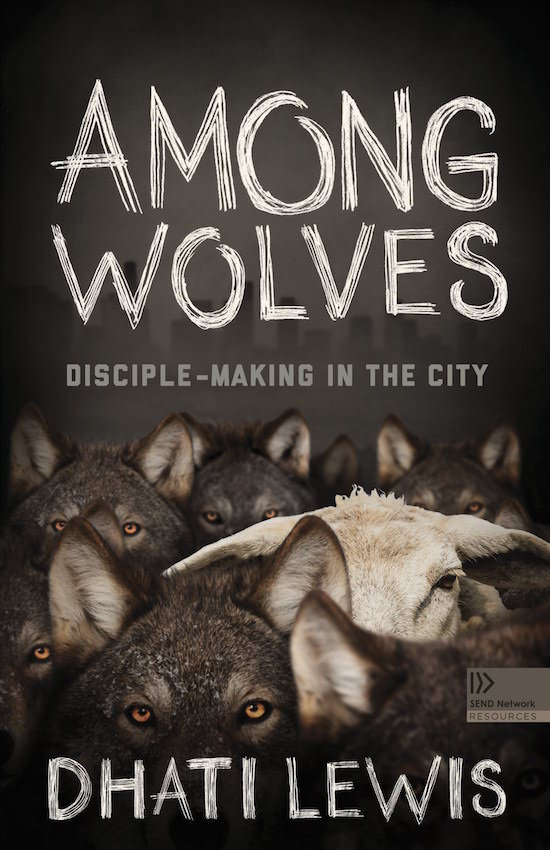How do we turn passive participants into active disciple makers in an ever changing urban context?
We have reduced Christianity to concerts, conferences, and church services. We are surrounded by passive participants of Christianity, content to soak in information without any intent to make disciples. But the question remains: how do we turn passive participants into active disciple makers in an ever changing urban context?
Among Wolves seeks to help us move to obedience to the call of Christ to labor among wolves. You will walk through eight significant movements in the book of Matthew, beginning with Jesus establishing His presence with us, to him mobilizing an army to go and make disciples of all nations.
As we follow Jesus’ patterns and teachings in Matthew, you will be equipped to establish a thriving disciple making culture in your context as your burden to see your city reached moves toward reality.
 The book was written to develop men and women within the urban context, and come alongside these practitioners to develop and defend a culture of disciple-making. To define the term, a practitioner is someone who is actively engaged with or “practicing” the issues at hand. If you live in a community with people who are different from you, then you are a practitioner!
The book was written to develop men and women within the urban context, and come alongside these practitioners to develop and defend a culture of disciple-making. To define the term, a practitioner is someone who is actively engaged with or “practicing” the issues at hand. If you live in a community with people who are different from you, then you are a practitioner!
As the pastor of a church in the heart of an urban context, I have felt these challenges of doing ministry. Even in the midst of the challenges and joys, we remain committed to being an answer to the prayer of Matthew 9:37–38, when Jesus called His disciples to pray to the Lord of the harvest to send out more laborers.
Tweet this: We have reduced Christianity to concerts, conferences, and church services. @dhati
The aim of Among Wolves is four-fold:
1. Gospel-Centered: Among Wolves aims to help practitioners develop a deeper devotion for the person and work of Christ through His Word. Throughout the book, we will allow the Gospel of Matthew to be our guide. This Gospel begins with the burden to establish God’s tangible presence and ends with a confirmation of His presence and commission to continue the family’s business.
2. Local Church-Based: Among Wolves aims to equip practitioners to make disciples within the context of the local church. Urban practitioners will develop an understanding of the identity of the church as family, allowing that to shape the activities of their local gathering. This can be applied in multiple contexts, such as Bible study groups, missional communities, and small groups—anywhere you seek to co-labor with other believers.
3. Disciple-Making Oriented: Among Wolves aims to equip the practitioner to see disciple-making, not as a ministry, but as the ministry of the local church.
4. Urban-Focused: Among Wolves aims to help the practitioner navigate through the beauty, complexity, density, and diversity that city-life brings.
The following is an overview of the eight movements of Matthew we will cover:
Movement 1: Vision from Burden
God’s vision for your life is all about you and not about you at all. Understanding God’s story, your personal story, the story of people around you, and the story of your city will help you discover what God is specifically asking of you.
Movement 2: Establishing Family
The church is not like a family, it is a family in which God is our Father, Jesus is our elder brother, and we are brothers and sisters in Christ.
Movement 3: Entering the Mission
As we enter God’s mission, God allows trials, temptations, and spiritual warfare as a means to prepare us for ministry, to instill in us greater discipline, and to draw us into deeper dependency on the Father.
Movement 4: Framing Disciple-Making
Disciple-making is our capacity to lovingly transmit and embody the life of Jesus through the life of His followers. If it takes a village to raise a child, it takes a church to raise a Christian. Disciple-making is not a ministry of the church, it is the ministry of the church.
Movement 5: A call to disciple-making: a call to labor
God’s presence is the fuel that empowers us to be fully committed to His call, to live fully as those sent to be sheep among wolves.
Movement 6: Training from Service
Laboring for the harvest is a critical part of our sanctification and growth, it moves us to compassion, reinforces our identity, reminds us of our inadequacy, compels us to pray, and it ultimately an act of obedience to our call to live radical, countercultural lives.
Movement 7: Mobilizing Corporately for mission
If we are to mobilize corporately for mission, we must hold to a compelling vision of Christ’s call, move away from the anti-vision, resist uniformity, and move together in unity.
Movement 8: Unleashing disciple-makers
In obedience to our Preeminent Christ, we pursue the Great Commission’s call for us to make disciples in our jobs, our homes, and our neighborhoods—all with the goal of recapturing those arenas as vital gospel ground. We fulfill the Great Commandment while we do the Great Commission.
Free Download from Among Wolves:
Want to download a free chapter from Among Wolves? Just follow the directions below:
